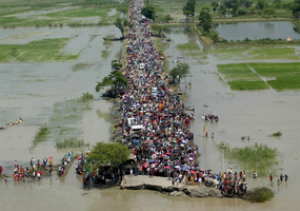 Betroffene: Über 3’000 Familien in den sechs Dörfern Holiya, Betahani, Gangapur, Fatepur, Mataiya and Bankatti im Bezirk Banke
Betroffene: Über 3’000 Familien in den sechs Dörfern Holiya, Betahani, Gangapur, Fatepur, Mataiya and Bankatti im Bezirk Banke
Verantwortliche: Regierungen von Nepal und von Indien
Der Fall: Jedes Jahr gefährden verheerende Fluten das Leben von mehr als 3’000 Familien. Obwohl es in diesem Teil Nepals schon immer zu leichten Überschwemmungen kam, führte erst der Bau des Laxmanpur-Dammes und des Kalkalwa-Dammes durch Indien zu der enormen Verstärkung dieses Naturereignisses. Die beiden Dämme befinden sich an der Grenze von Indien und Nepal und verändern den natürlichen Verlauf des Rapti-Flusses und zwei seiner Nebenflüsse. Die jährlichen Überflutungen bewirken regelmässig Verlust von Ernten, Hunger, Mangelernährung und wasserbürtige Krankheiten, Verlust von Menschenleben und Vieh sowie Beschädigung von Häusern und Eigentum. Der fruchtbare Boden wird oftmals vollständig weggespült. Die Ernteverluste und der Einkommensrückgang sind Dorfbewohner gezwungen auszuwandern und in indischen Städten nach Arbeit zu suchen, um ihre Familien durchzubringen.
Um die Menschen vor den Überflutungen zu schützen, wäre ein Schutzdamm auf beiden Seiten des Flusses die einzige langfristig sinnvolle Lösung. Der Bau eines solchen Deichs ist von der Regierung jedoch nicht geplant. Dabei drohen die jüngsten Baupläne Indiens die Überflutungen noch zu verstärken: Es soll ein weiterer mit dem Kalkalwa-Damm verbundener Damm gebaut werden.
Die Region wurde dieses Jahr im August bereits schwer von Überflutungen getroffen, wobei ein bestehender Deich, eine der Hauptschutzmassnahmen des Staates, vollkommen zerstört wurde. Nepal ist dazu verpflichtet, die Sicherheit der eigenen Bevölkerung zu gewährleisten und ihnen angemessene Unterkunft, eine Existenzgrundlage und ausreichend Nahrung und Wasser zu garantieren. Trotz mehrfacher Beschwerden hat die Regierung nicht angemessen auf die Überflutungen reagiert und weder einen langfristigen Plan für den Wiederaufbau entwickelt noch der Bevölkerung Entschädigungen für den Verlust von Eigentum, Vieh und Ernteerträgen ausgezahlt.
Indien ist völkerrechtlich verpflichtet sicherzustellen, dass eigene Bauprojekte nicht das Recht auf Nahrung in Nepal verletzen. Diese extraterritoriale Staatenpflicht ist in den Maastrichter Prinzipien zu den Extraterritorialen Staatenpflichten im Bereich der wirtschaftlichen, sozialen und kulturellen Rechte festgelegt.
Aktion: Machen Sie mit! Senden Sie bitte anhand des untenstehenden Textvorschlags ein Mail oder einen Brief an:
Mr. Sushil Koirala
Prime Minister
Office of the Prime Minister and Council of Ministers
Singh Darbar
P.O. Box: 23312
Kathmandu
Nepal
info@opmcm.gov.np
mit Kopien an:
Ambassade du Népal
Chancellerie
Rue de la Servette 81
1202 Genève
mission.nepal@bluewin.ch
Mr. Mahendra Bahadur Pandey
Minister of Foreign Affairs
Ministry of Foreign Affairs
Singh Darbar
Kathmandu
Nepal
info@mofa.gov.np
Mr. Narayan Prakash Saud
Minister of Irrigation
Ministry of Irrigation
Singh Darbar
Kathmandu
Nepal
info@moir.gov.np
Mr. Bamdev Gautam
Minister of Home Affairs
Ministry of Home Affairs
Singh Darbar
Kathmandu
Nepal
gunaso@moha.gov.np
Mr. Anup Raj Sharma
Chairperson of the National Human Rights Commission
National Human Rights Commission
Pulchowk
Lalitpur
Nepal
complaints@nhrcnepal.org
Laufzeit: bis 15. Februar 2015
Bitte lassen Sie uns (kontakt@fian-ch.org) Kopien Ihrer Mails oder Briefe (oder zumindest eine entsprechende Mitteilung) zukommen, damit wir die Teilnahme an der Aktion messen können. Bitte informieren Sie uns auch, wenn Sie eine Antwort erhalten. Besten Dank!
Sie können untenstehenden Textvorschlag in das Mail bzw. den Brief kopieren, den Text nach Bedarf redigieren oder einen eigenen Text verfassen:
Right Honourable Prime Minister,
Recently I was informed about the situation of devastating floods and subsequent erosion threatening the livelihoods of more than 3000 families in Holiya, Betahani, Gangapur, Fatepur, Mataiya and Bankatti VDCs in Banke district, Nepal every year. Problems of inundation, flooding, soil erosion and deposition of sand are largely due to the construction of Laxmanpur barrage and the Kalkalwa Afflux Bund constructed by the Government of India in 1985 and 2000 respectively.
I appreciate that data collection on loss and damage of the property has been completed in 4 VDCs and do hope that data collection in the two remaining VDCs will be completed soon. Another positive development is the construction of a bridge by the Holiya VDC and the initiative for a 700 meters permanent embankment in Holiya VDC.
However, I am concerned about further necessary measures in this matter. Nepal is obligated to fulfil the human right to adequate food of the flood affected communities, by providing compensation, adequate re-settlement, and sufficient food and water during flooding periods. By failing to provide adequate emergency response and to establish a productive long-term rehabilitation program, Nepal breached international law and its own constitution. Furthermore, the Government of Nepal has failed to secure the safety of its citizens by not effectively coordinating with the Indian Government urging it to comply with its obligations under international law and with the existent agreements and treaties between the two countries. India is duty-bound under international law to respect people’s right to adequate food. This obligation applies also for areas beyond India’s borders.
In line with the human rights obligations of your government towards the realization of the right to adequate food of the affected communities, I would like to ask you to:
• Demand from the Government of India to properly construct and adequately operate the water passing gates during rainy season;
• Demand from the Government of India to build the permanent embankment of 28 km on both sides of river Rapti as a safeguard in line with the recommendation of Water Induced Disaster Prevention Division Office, Nepalgunj, Banke;
• Declare Special Zone in all six dam affected VDCs and implement special programs accordingly;
• Conduct a human rights impact assessment in order to establish the impact that the dam has had on the right to adequate food of the affected communities and adopt all necessary measures (data collection of damages and losses, identification and resettlement of displaced people) to ensure remedies to the affected people.
Please keep me informed of the action you plan to take in this regard.
Yours sincerely,
(IHR NAME)
cc:
- Embassy of Nepal, Geneva, Switzerland
- Mr. Mahendra Bahadur Pandey, Minister of Foreign Affairs
- Mr. Narayan Prakash Saud, Minister of Irrigation
- Mr. Bamdev Gautam, Minister of Home Affairs
- Mr. Anup Raj Sharma, Chairperson of the National Human Rights Commission
